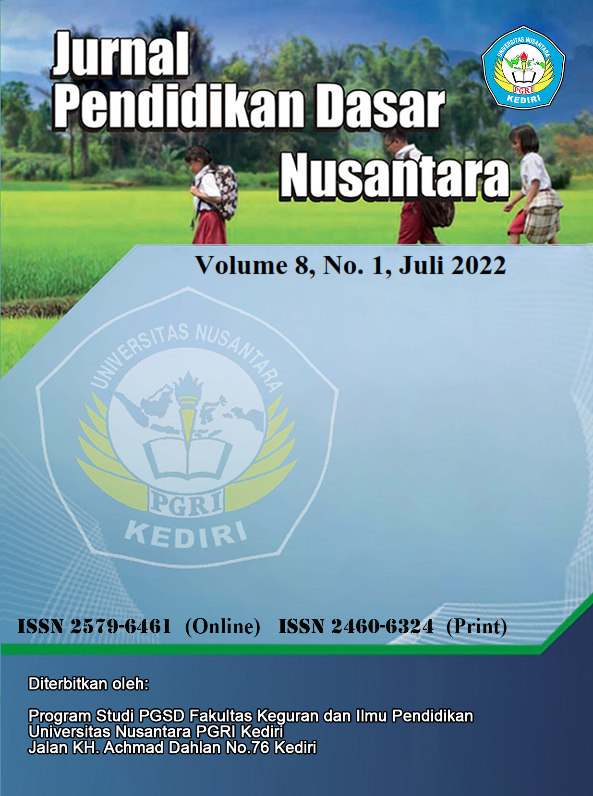ANALYSIS OF STUDENT LEARNING OUTCOMES IN SDN KALIKUNING 05 DURING ONLINE LEARNING
DOI:
https://doi.org/10.29407/jpdn.v8i1.16841Keywords:
learning outcome; implementation;online learningAbstract
This study aims to determine the learning outcomes of SDN Kalikuning 05 students, especially fourth grade students during online learning. This research is a qualitative research using a descriptive approach. The subjects in this study were 10 students and 1 teacher. Data collection was taken through observation, questionnaires, and direct interviews. The results of this study indicate that when viewed from the learning outcomes the average grade IV students in online learning for the even semester 2020/2021 obtained an average grade value of 78.3. While when compared with the learning outcomes of class students in the odd semester of 74, 6. So the acquisition of student learning outcomes in this even semester has increased. Based on the results of the research above, it can be said that if it is seen that the average value of student learning outcomes in even semesters, online learning can be said to have been effective. However, when viewed from the various problems faced by online learning, it is still less effective and still needs to be improved and considered again, both from teachers and students.
Downloads
References
Aisyah, S. and Sari, D. I. (2021) ‘EFEKTIVITAS PENGGUNAAN PLATFORMGOOGLEMEET TERHADAP HASIL BELAJAR SISWA’, JURNAL MathEdu (Mathematic Education Journal), 4(1), pp. 45–49.
Bhagaskara, A. E., Afifah, E. N., & Putra, E. M. (2021). Pembelajaran dalam jaringan (daring) berbasis whatsapp di sd yapita. ZAHRA: Research and Tought Elementary School of Islam Journal, 2(1), 13-23.
Dewi, W. A. F. (2020). Dampak Covid-19 terhadap implementasi pembelajaran daring di Sekolah Dasar. Edukatif: Jurnal Ilmu Pendidikan, 2(1), 55-61. https://edukatif.org/index.php/edukatif/article/view/89/pdf
Kemendikbud, P. W. (2020). Kemendikbud Imbau Pendidik Hadirkan Belajar Menyenangkan Bagi Daerah yang Terapkan Belajar di Rumah.
Nugraha, H. D., Poniman, D., Kencanasari, R. V., Maosul, A., & Rusydi, M. I. (2020). Meta-Analisis Model Pembelajaran Vokasi dalam Kondisi Covid-19. Jurnal Dinamika Vokasional Teknik Mesin, 5(2), 83-94.
Aisyah, S. and Sari, D. I. (2021) ‘EFEKTIVITAS PENGGUNAAN PLATFORMGOOGLEMEET TERHADAP HASIL BELAJAR SISWA’, JURNAL MathEdu (Mathematic Education Journal), 4(1), pp. 45–49.
Nurjanah, E. (2021) ‘Penerapan Pembelajaran Daring di Masa Pandemi Covid-19 di’, Didactical Mathematics, 3(2), pp. 49–58.
Nuriansyah, F. (2020). Efektifitas penggunaan media online dalam meningkatkan hasil belajar pada mahasiswa pendidikan ekonomi saat awal pandemi Covid-19. Jurnal pendidikan ekonomi Indonesia, 1(2).
Nurmaulia, A. kesan peserta didik terhadap kefektifitas pembelajaran daring di saat pandemi. https://widyasari-press.com/wp-content/uploads/2022/01/1.-Andita-Nurmaulia-Kesan-Peserta-Didik-Terhadap-Kefektifitas-Pembelajaran-Daring-di-Saat-Pandemi.pdf
Oktavian, R., & Aldya, R. F. (2020). Efektivitas pembelajaran daring terintegrasi di era pendidikan 4.0. Didaktis: Jurnal Pendidikan dan Ilmu Pengetahuan, 20(2).
Pratama, A. P. (2021). Pengaruh pembelajaran daring terhadap motivasi belajar siswa sd. Mahaguru: jurnal pendidikan guru sekolah dasar, 2(1), 88-95.
Putria, H., Maula, L. H. and Uswatun, D. A. (2020) ‘Analisis Proses Pembelajaran dalam Jaringan (DARING) Masa Pandemi Covid- 19 Pada Guru Sekolah Dasar’, Jurnal Basicedu, 4(4), pp. 861–870. doi: 10.31004/basicedu.v4i4.460
Rahayu, S. and Pahlevi, T. (2021) ‘Pengaruh Media Pembelajaran E-learning dengan Google Meet Terhadap Hasil Belajar Siswa’, Jurnal Penelitian dan Pengembangan Pendidikan, 5(1), pp. 91–99. Available at: https://ejournal.undiksha.ac.id/index.php/JJL/index.
Ritonga, D. A., Azmi, C. and Sunarno, A. (2020) ‘The Effect of e-Learning Toward Student Learning Outcomes’, 23(UnICoSS 2019), pp. 29–30. doi: 10.2991/ahsr.k.200305.010.
Yunitasari, R. and Hanifah, U. (2020) ‘Pengaruh Pembelajaran Daring terhadap Minat Belajar Siswa pada Masa COVID 19’, Edukatif : Jurnal Ilmu Pendidikan, 2(3), pp. 232–243. doi: 10.31004/edukatif.v2i3.142.
Zain, N. H., Sayekti, I. C. and Eryani, R. (2021) ‘Problematika Pembelajaran Daring pada Peserta Didik di Sekolah Dasar’, Jurnal Basicedu, 5(4), pp. 1840–1846. Available at: https://jbasic.org/index.php/basicedu/article/view/1051.
Zhang, D., Zhao, J. L., Zhou, L., & Nunamaker, J. F. (2004). Can e-learning replace classroom learning? Communications of the ACM.
Downloads
Published
Issue
Section
License
Authors who publish with this journal agree to the following terms:
- Copyright on any article is retained by the author(s).
- The author grants the journal, the right of first publication with the work simultaneously licensed under a Creative Commons Attribution License that allows others to share the work with an acknowledgment of the work’s authorship and initial publication in this journal.
- Authors are able to enter into separate, additional contractual arrangements for the non-exclusive distribution of the journal’s published version of the work (e.g., post it to an institutional repository or publish it in a book), with an acknowledgment of its initial publication in this journal.
- Authors are permitted and encouraged to post their work online (e.g., in institutional repositories or on their website) prior to and during the submission process, as it can lead to productive exchanges, as well as earlier and greater citation of published work.
- The article and any associated published material is distributed under the Creative Commons Attribution-ShareAlike 4.0 International License

































